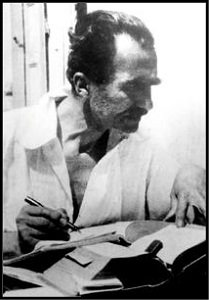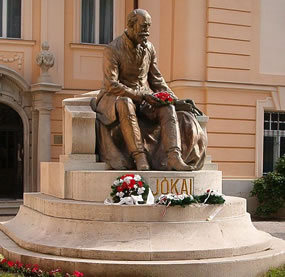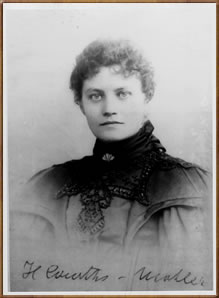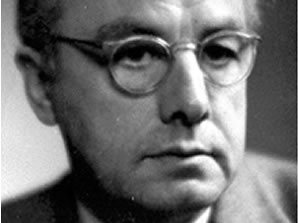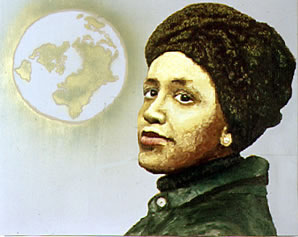De Amerikaanse schrijver Nick McDonell werd geboren op 18 februari 1984 in New York. Hij stamt uit de rijke, blanke Upper East Side van Manhattan. McDonell schreef een roman over zijn rijke, blanke, verveelde leeftijdsgenoten, Twelve. Lang voordat het boek in 2002 uitkwam, begonnen er in tijdschriften als de New Yorker artikelen te verschijnen over McDonell en zijn achtergrond. Vader werkte voor Rolling Stone en Esquire, moeder schrijft romans en filmscenario’s, en onder de huisvrienden bevinden zich Hunter S. Thompson, Jay McInerney, P.J. O’Rourke, Joan Didion en andere schrijvers, die niet te beroerd waren om Nicks boek te voorzien van aanbevelingen. In 2005 verscheen zijn tweede roman The Third Brother.
Uit: Twelve
„White Mike is thin and pale like smoke.
White Mike wears jeans and a hooded sweatshirt and a dark blue Brooks Brothers overcoat that hangs long on him. His blond hair, nearly white, is cropped tight around his head. White Mike is clean. White Mike has never smoked a cigarette in his life. Never had a drink, never sucked down a doobie. But White Mike has become a very good drug dealer, even though it started out as a one-shot deal with his cousin Charlie.
White Mike was a good student, but he’s been out of school for six months, and though some people might wonder what he’s doing, no one seems to care very much that he’s taking a year off before college. Maybe more than a year. White Mike saw that movie American Beauty about a kid who is a drug dealer and buys expensive video equipment with the money he makes. The kid says that sometimes there is so much beauty in the world that sometimes you just can’t take it. Fuck that, thinks White Mike.
White Mike is not looking at beauty. He is looking at the Upper East Side of Manhattan. It is two days after Christmas and all the kids are home from boarding school and everyone has money to blow. So White Mike is busy with a pickup in Harlem and then ounces and fifties and dimes and loud music and packed open houses and more rounds and kids from Hotchkiss and Andover and St. Paul’s and Deerfield all looking to get high and tell stories about how it is to kids from Dalton and Collegiate and Chapin and Riverdale, who have stories, of their own. All the same stories, really“.
Nick McDonell (New York, 18 februari 1984)
De Vlaamse dichter en schrijver Gaston Burssens werd geboren in Dendermonde op 18 februari 1896. Zie ook mijn blog van 18 februari 2008.
De drie gezellen
In het loof van jasmijnestruikjes
zit ik bij de wijn.
Vrienden laat nu ’t goede uur opduiken!
Daar buigt zich de maan met gouden schijn
in de klare sloot,
en hoffelik buig ik me met haar
en m’n schaduw met sierlik gebaar
buigt zich als derde bondgenoot.
De maan wil ik drinken,
laat het zo blijven.
Schaduw, laat ons klinken!
Maar het arme kind ontvangt geen drop.
Ons beider dorst wil ik samerijven
en voor drie drinken en lachen
zolang geen dorre takken
de grond slaan en m’n kop.
Zie de maan: ze lacht om m’n gezangen.
Zie m’n schaduw: ze danst en springt
als was ze alleen in verlangen.
Als zich de nevel van de roes in m’n hersens dringt
zorg dan in roes met mij te zijn.
Tot weerziens alle drie,
morgen avend in ’t bloesemloof bij de wijn.
Adieu
à Yvette
Adieu. Dit zijn de laatste noten
die ik gespeeld heb op mijn ribbenkast.
Een kast, waarvan ik in de laden
wat blanco vellen heb geborgen,
papieren voor de dorst.
Zij zullen met mij begraven worden,
mishandeld en mijn slaven worden
en adders aan mijn borst.
Maar goed. Vandaag ben ik nog krekel,
doch morgen ben ik mier,
die overmorgen al zijn hekel
¬– uit zijn reserves in de pekel –
aan apropos, atoom en spirocheten
posthuum zal zetten op papier.
Adieu! Wie weet of ik niet zal beklijven
door ’t schrijven van een later lied,
of ik het schrijven zal of niet.
Zinloos of niet.
Levend of niet.
Gaston Burssens (18 februari 1896 – 29 januari 1965)
De Nederlandse dichter Bart FM Droog werd geboren in Emmen op 18 februari 1966. Zie ook mijn blog van 18 februari 2008.
IJsselglijden
Aan boord van het motorpersoonschip Organza
laven we ons aan uiterwaarden en zicht op gevogelte
zo nemen we waar de eend, de aalscholver, de gans
de meeuw, de zwaan en al wat verder vliegt
over het groene land dat aan dit water grenst
ach, hoe leeg de rivier, hoe ijdel ons vermaak
glijdend over de IJssel van Deventer naar Zutphen
en in Zutphen weer terug, het heen en weer
is aan pontschippers en ons want ook
al wat vliegt en zwemt, de baars, de snoek
de voorn, de karper en de gespekte tjiftjaf
lomen zich in en op en boven de wateren voort
Stemmen
Stemmen deed ze nooit
ze hoorde stemmen in haar hoofd
stemmen die haar ontstemden
kiezen deed ze nooit
ze had kiezen in haar kop
kiezen die knarsten en kraakten
nee, waarom zou ze
zich inlaten met het leven
met al die zaken in haar brein?
de boeken gingen branden
panden werden leeg gesleurd
en zij zat daar te staren
zich nog minder dan bewus

Bart FM Droog (Emmen, 18 februari 1966)
De Nederlandse dichter,vertaler en schilder Huub Beurskens is geboren in Tegelen op 18 februari 1950. Zie ook mijn blog van 18 februari 2007 en ook mijn blog van 18 februari 2008.
Etruskische sarcofaag
voor Hans Berghuis
Even bestaat de dood daar niet, althans
een huis is hij, alles konden we er bergen
en blijven, liggend, spijzend, converserend
met de glimlach van de liefste en haar zoen.
De dood had de tijd niet te verdrijven.
Hoe moet het zich geleefd hebben, bij levenden
lijve, fluitspelend, bloei van kruiden,
grazende kudden rondom Caere, toen!
Waarom dan dat meten, woelend in een lever,
en stenen naar een vogelvlucht gesmeten?
Quasarwikkers, DNA-auguren, verzekeringsmeneren
Geloof de dichters, elk zijn zij de dioscuren,
hun behuizing is de drempel van allebei de sferen,
daar stoken zij zich de dood tot levensvatbare figuren.
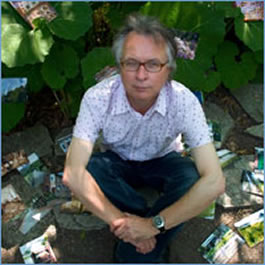
Huub Beurskens (Tegelen, 18 februari 1950)
De Afro-Amerikaansschrijfster Toni Morrison werd geboren op 18 februari 1931 in Lorain, Ohio. Zie ook mijn blog van 18 februari 2007.
Uit: Love
„The day she walked the streets of Silk, a chafing wind kept the temperature low and the sun was helpless to move outdoor thermometers more than a few degrees above freezing. Tiles of ice had formed at the shoreline and, inland, the thrown-together houses on Monarch Street whined like puppies. Ice slick gleamed, then disappeared in the early evening shadow, causing the sidewalks she marched along to undermine even an agile tread, let alone one with a faint limp. She should have bent her head and closed her eyes to slits in that weather, but being a stranger, she stared wide-eyed at each house, searching for the address that matched the one in the advertisement: One Monarch Street. Finally she turned into a driveway where Sandler Gibbons stood in his garage door ripping the seam from a sack of Ice-Off. He remembers the crack of her heels on concrete as she approached; the angle of her hip as she stood there, the melon sun behind her, the garage light in her face. He remembers the pleasure of her voice when she asked for directions to the house of women he has known all his life.
“You sure?” he asked when she told him the address.
She took a square of paper from a jacket pocket, held it with ungloved fingers while she checked, then nodded.
Sandler Gibbons scanned her legs and reckoned her knees and thighs were stinging from the cold her tiny skirt exposed them to. Then he marveled at the height of her bootheels, the cut of her short leather jacket. At first he’d thought she wore a hat, something big and fluffy to keep her ears and neck warm. Then he realized that it was hair-blown forward by the wind, distracting him from her face. She looked to him like a sweet child, fine-boned, gently raised but lost.“
Toni Morrison(Lorain, 18 februari 1931)
De Griekse schrijver Níkos Kazantzákis werd geboren in Heraklion op 18 februari 1883. Zie ook mijn blog van 18 februari 2007.
Uit: Zorba the Greek
„My dear friend,
“I am writing to you from a lonely shore in Crete where destiny and I have agreed I should stay several months to play – to play at being a capatlist. If my game succeeds, I shall say it was not a game, but that I had made a great resolution and changed my mode of life.
“You remember how, when you left, you called me a bookworm. That so vexed me I decided to abandon my scribbling on paper for a time – or for ever? – and to throw myself into a life of action. I rented a hillside containing lignite; I engaged wormen and took picks and shovels, acetylene lamps, baskets, trucks. I opened up galleries and went into them. Just like that, to annoy you. And by dint of digging and making passages in the earth, the bookworm has become a mole. I hope you approve of the metamorphosis.
“My joys here are great, because they are very simple and spring from the everlasting elements: the pure air, the sun, the sea and the wheaten loaf. In the evening an extraordinary Sindbad-the-Sailor squats before me, Turkish fashion, and speaks. He speaks and the world grows bigger. Occasionally, when words no longer suffice , he leaps up and dances. And when dancing no longer suffices he places his santuri on his knee and plays.
“Sometimes he plays a savage air and you feel you are choking because you realise all at once that your life is colourless, miserable and unworthy of man. Sometimes he plays a dolorous air and you feel your life passing, running away like sand between your fingers, and that there is no salvation.
“My heart is going to and fro in my breast like a weaver’s shuttle. It is weaving these few months which I am spending in Crete, and – God forgive me – I believe I am happy.
“Confucius says: ‘Many seek happiness higher than man; others beneath him. But happiness is the same height as man.’ That is true. So there must be a happiness to suit every man’s stature. Such is, my dear pupil and master, my happiness of the day. I anxiously measure it and measure it again, to see what my stature of the moment is. For, you know this very well, man’s stature is not always the same.
“How the soul of man is transformed according to the climate, the silence, the solitude, or the company in which it lives!“

Níkos Kazantzákis (18 februari 1883 – 26 oktober 1957)
De Amerikaanse schrijfster Jean Marie Auel werd geboren op 18 februari 1936 in Chicago. Zie ook mijn blog van 18 februari 2007 en ook mijn blog van 18 februari 2008.
Uit: The Shelters of Stone
„People were gathering on the limestone ledge, looking down at them warily. No one made a gesture of welcome, and some held spears in positions of readiness if not actual threat. The young woman could almost feel their edgy fear. She watched from the bottom of the path as more people crowded together on the ledge, staring down, many more than she thought there would be. She had seen that reluctance to greet them from other people they had met on their Journey. It’s not just them, she told herself, it’s always that way in the beginning. But she felt uneasy.
The tall man jumped down from the back of the young stallion. He was neither reluctant nor uneasy, but he hesitated for a moment, holding the stallion’s halter rope. He turned around and noticed that she was hanging back. “Ayla, will you hold Racer’s rope? He seems nervous,” he said, then looked up at the ledge. “I guess they do, too.”
Jean M. Auel (Chicago, 18 februari 1936)
De Duitse schrijfster Hedwig Courths-Mahler werd geboren in Nebra (Saksen-Anhalt) op 18 februari 1867. Zij was een buitenechtelijk kind van de marketentster Henriette Mahler en de binnenschipper Ernst Schmidt. Aangezien haar vader nog voor haar geboorte gestorven was groeide Hedwig bij een pleeggezin in Weißenfels op. Zij verliet op jonge leeftijd de school om geld te gaan verdienen. In Leipzig werd ze gezelschapsdame van een oude dame, die ze ook moest voorlezen. Daarbij ontdekte ze het plezier in schrijven. Op zeventienjarige leeftijd schreef zij haar eerste vertelling Wo die Heide blüht, deze werd in een plaatselijke krant gepubliceerd. In Halle (Saksen-Anhalt) werkte zij daarna als verkoopster. In 1889 trouwde zij in Leipzig met de kunstschilder en decorateur Fritz Courts en kreeg twee dochters. Pas in 1904 verscheen in het Chemnitzer Dagblad -als feuilleton- haar eerste roman Licht und Schatten. Daarna werd zij een zeer productieve auteur, die jaarlijks meerdere romans publiceerde. Al haar romans volgen hetzelfde stramien. Sociaal achtergestelden overwinnen het standsverschil door de liefde. De geliefden strijden tegen allerlei intriges en vinden samen het geluk, rijkdom en aanzien. De naam Courths-Mahler werd bijna een synoniem voor “Trivialliteratur”. In totaal schreef zij ruim 200 romans met een totale oplage van ongeveer veertig miljoen stuks.
Uit: Ich lieb’ in dir die ganze Welt
„Baroness Annedore kuvertierte gerade den Brief, den sie an ihre beste Freundin aus dem Pensionat geschrieben hatte, als sie von der Terrasse jemanden ihren Namen rufen hörte. Es war Komtess Lilly.
„Kommen Sie doch herunter, liebe Annedore! Wir erwarten Sie mit Sehnsucht am Teetisch, und Lothar hat mich voll Ungeduld nach Ihnen ausgesandt.“
„Ich komme gleich“, rief Annedore ihr zu. Damit schloss sie hastig ihre Schreibmappe, ordnete vor dem Spiegel ihr Haar und eilte dann hinunter.
Komtess Lilly war inzwischen über die das ganze Schloss umgebende Terrasse auf die andere Seite gegangen. Da saß ihr Bruder Lothar unter einem grau und blau gestreiften Sommerzelt an einem einladend gedeckten Teetisch. Er war ein sehr hübscher, eleganter Mann von 28 Jahren, den selbst das Einglas im Auge vorzüglich kleidete.
Er sah seiner Schwester erwartungsvoll entgegen. „Nun, Lilly, kommt das Baronesschen?“
„Ja, sie kommt gleich. Bezähme deine Sehnsucht noch zwei Minuten“, erwiderte sie mit spöttischem Lächeln.
Graf Lothar lachte leichtsinnig. „Du brauchst gar nicht so spöttisch meine Sehnsucht zu betonen, Lilly. Annedore ist ein so reizendes, frisches Mädel, dass man sich auch in sie verlieben könnte, wenn sie nicht glücklicherweise eine so reiche Erbin wäre.“

Hedwig Courths-Mahler (18 februari 1867 – 26 november 1950)
De Duitse dichteres en schrijfster Elke Erb werd geboren op 18 februari 1938 in Scherbach in de Eifel. In 1949 verhuisde zij naar Halle in de DDR. Na enkele jaren op het land gewerkt te hebben studeerde zij germanistiek, geschiedenis en pedagogie. Sinds 1966 is zij zelfstandig schrijfster. Ook is zij werkzaam als vertaalster en uitgeefster.
RUNDUM
Siebengestirn eines Vogels Bootes
Das Wasser des Quais oder Morgens
Unbeseelt nicht Niemand /
rudert Es lodert
ludert Bootskiel Schiffskiel Bug
Wie jener Jungfrau Profil Fischfrau
Fischschwanz das Bäuchlein kugelrund
tanzt Sie ruhten nicht wenn der Mond
schien Sie hatten die
Sinne beisammen Rechts Links
wie unlängst Ergrauen-
der Hain Gebüschrest
am Hügel
Am Hügelrücken Am Mais
kam der Abend rötete ihn Da war
aufgespannt Sommer
Elke Erb (Scherbach, 18 februari 1938)
De Noorse schrijver Alexander Lange Kielland werd geboren in Stavanger op 18 februari 1849. Met Henrik Ibsen, Jonas Lie en Bjørnstjerne Bjørnson wordt hij gerekend tot De Grote Vier van de Noorse literatuur. Kielland kwam uit een welgesteld koopmansgezin. Zelf zou hij – hoewel welgesteld en zelf directeur van een steenfabriek – zich zijn leven lang het lot van de minvermogenden blijven aantrekken. Zijn werk was sterk realistisch. Rond het jaar 1890 legde hij de pen neer en begon een tweede loopbaan in de politiek.
Uit: Else – Eine Weihnachtsgeschichte (Vertaald door Marie Leskien-Lie en Fr. Leskien)
„Ja, aber wir müssen bedenken, meine Damen und Herren, daß es hier nicht bloß gilt, der bedrängten Menschheit ganz im allgemeinen zu Hilfe zu kommen, sondern daß wir uns die Aufgabe gestellt haben, unsere Wirksamkeit auf ein bestimmtes Gebiet zu beschränken. Obwohl ich mich von ganzem Herzen den von Herrn Konsul With vorgetragenen Argumenten anschließe, so muß ich zugleich doch daran festhalten, daß wir nicht über die von uns selbst gesteckten Grenzen hinausgehen dürfen. Es ist wohl möglich, daß die Not – und was uns hier im besonderen betrifft: die sittliche Verderbnis unter den jungen Mädchen –, daß sie ebenso groß, ja vielleicht viel größer in der Gemeinde Sankt Pauli als hier in Sankt Petri ist. Aber ich glaube doch: Wenn unsere Arbeit wirklich sichtbare Früchte zum Segen tragen soll, so müssen wir uns innerhalb der von Gott selbst gewiesenen Grenzen halten, und das heißt, so meine ich, innerhalb unserer eigenen Gemeinde.«
»Oh, wie wahr das ist, was der Kaplan da sagt«, sagte Frau Bentzen froh; »es ist ganz wie damals, bevor mir meine bestimmten Armen zugeteilt wurden. Alles, was ich gab, was wir mit vollen Händen verteilten, verschwand spurlos, und es kamen nur immer mehr, die bettelten und etwas haben wollten. Aber jetzt lasse ich das Mädchen nur antworten: Wir haben unsere bestimmten Kunden. So weiß man, daß kein Unwürdiger etwas bekommt, und dann kann man die unsichtbaren Früchte – nein–, die gesegneten Früchte –; oder wie sagte der Kaplan doch? Es war ebenso wahr wie schön.«
»Sichtbare Früchte zum Segen«, sagte der Kaplan und errötete bescheiden.“

Alexander Kielland (18 februari 1849 – 6 april 1906)
De Hongaarse schrijver en journalist Mór Jókai werd geboren op 18 februari 1825 in Komárom. Hij was vooral schrijver van historische romans. Hij wijdde zich ook een leven lang aan de Hongaarse taal. Verder was hij uitgever van het satirische blad Az Üstökös dat van 1861 tot 1920 in Wenen verscheen en waain hij onder het pseudoniem Kakas Márton ook zelf schreef.
Uit: The Corsair King
“You see, gentlemen, you see the contemptuous face with which he receives your offer, you see how proudly, how scornfully he looks down upon you, as if it would be a disgrace to him to recognize such worthy men as judges. Oh, I will submit to your sentence, I have no desire to stand before wiser, more just or more distinguished judges. I will tell with my own lips everything of which I am accused.”
“I forbid you to do so!” cried Rolls vehemently.
“There, you see for yourselves, gentlemen. He wants to command here still, here, where you are the rightful possessors. He will not even permit me to repeat the charge against me! Very natural! He knows that he, and not I, will be condemned. So listen, gentlemen, listen, for what I have to tell is an important matter; my crime is that we were bringing huge bars of silver–“
“Ho! ho! that begins well,” shouted Asphlant, craning his neck to hear better.“
Mór Jókai (18 februari 1825 – 5 mei 1904)
Standbeeld in Boedapest
De Afro-Amerikaanse schrijfster, dichteres en lesbisch-feministische, anti-racistische activiste Audre Geraldine Lordewerd geboren op 18 februari 1934 in New York.Ze schreef en sprak over racisme, seksisme, klassisme en homofobie en over de manieren waarop deze haar raakten, zowel buiten als binnen de vrouwen-, holebi- en antiracistische beweging
The Black Unicorn
The black unicorn is greedy.
The black unicorn is impatient.
‘The black unicorn was mistaken
for a shadow or symbol
and taken
through a cold country
where mist painted mockeries
of my fury.
It is not on her lap where the horn rests
but deep in her moonpit
growing.
The black unicorn is restless
the black unicorn is unrelenting
the black unicorn is not
free.
Audre Lorde (18 februari 1934 – 17 november 1992)
Portret door Simone Bouyer
De Amerikaanse schrijver Wallace Stegner werd geboren op 18 februari 1909 in Lake Mills, Iowa. Hij doceerde aan de University of Wisconsin en aan Harvard University. In 1972 won hij de Pulitzer Prize for Fiction voor Angle of Repose. Het boek leidde tot een controverse die aan zijn reputatie nog steeds schade doet. De roman is namelijk gebaseerd op de brieven van de Amerikaanse schrijfster Mary Hallock Foote (later verschenen als memoires onder de titel A Victorian Gentlewoman in the Far West). Stegner had er teveel uit geput zonder bronvermelding. In 1977 won Stegner overigens wel weer de National Book Award voor The Spectator Bird. In 1996 kwam er een film uit over zijn leven, Wallace Stegner: A Writer’s Life, onder de regie van Stephen Jay Fisher.
Uit: Angle of Repose
„Right there, I might say to Rodman, who doesn’t believe in time, notice something: I started to establish the present and the present moved on. What I established is already buried under layers of tape. Before I can say I am, I was. Heraclitus and I, prophets of flux, know that the flux is composed of parts that imitate and repeat each other. Am or was, I am cumulative, too. I am everything I ever was, whatever you and Leah may think. I am much of what my parents and especially my grandparents were–inherited stature, coloring, brains, bones (that part unfortunate), plus transmitted prejudices, culture, scruples, likings, moralities, and moral errors that I defend as if they were personal and not familial.
Even places, especially this house whose air is thick with the past. My antecedents support me here as the old wistaria at the corner supports the house. Looking at its cables wrapped two or three times around the cottage, you would swear, and you could be right, that if they were cut the place would fall down.“
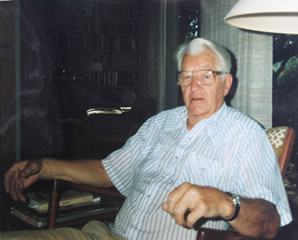
Wallace Stegner (18 februari 1909 – 13 april 1993)
Rectificatie: De Italiaanse dichter en schrijver Leone Battista Alberti werd geboren in Genua op 18 (en dus niet op 14) februari 1404. Zie ook mijn blog van 14 februari 2007.
Uit: The Architecture
„Do not think the Labour and Expence of a Building to be enter’d upon in a hurry; as well for several other Reasons, as also because a Man’s Honour and Reputation suffers by it. For as a Design well and compleatly finish’d brings Praise to him that has employ’d his Pains and Study in the Work; so if in any particular the Author seems to have been wanting, either of Art or Prudence, it detracts very much from that Praise, and from his Reputation. And indeed the Beauties or Faults of Edifices, especially publick ones, are in a Manner clear and mani fest to every body; and (I know not how it happens) any Thing amiss sooner draws Con tempt, than any Thing handsome or well finish’d does Commendation. It is really wonderful, how, by a Kind of natural Instinct, all of us knowing or ignorant, immediately hit upon what is right or wrong in the Contrivance or Execution of Things, and what a shrewd Judgment the Eye has in Works of this Nature above all the other Senses. Whence it happens,
that if any Thing offers itself to us that is lame or too little, or unnecessary, or un graceful, we presently find ourselves moved and desirous to have it handsomer.“
Leone Battista Alberti (14 februari 1404 — 25 april 1472)
Standbeeld in de Uffizi galerij, Florence.
